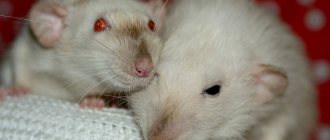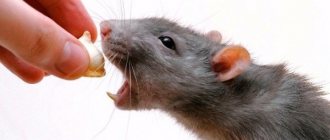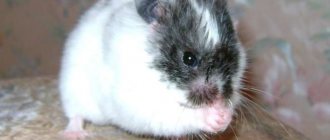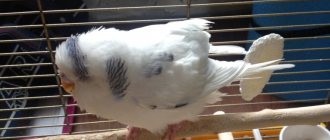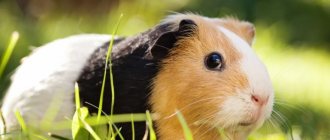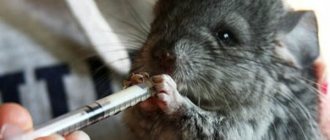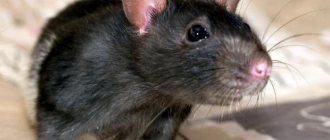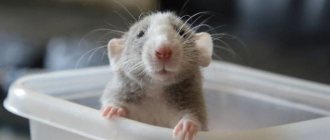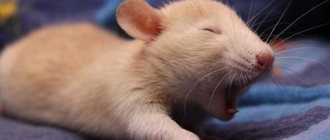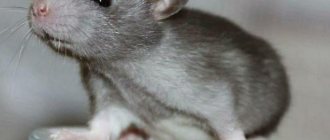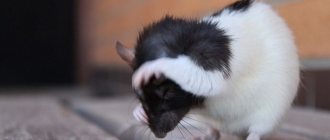Reasons why a rat may be choking or panting?
Attention! Due to the rapid metabolism of the decorative rat, diseases progress very quickly. It is impossible to identify them, much less cure them at home. Therefore, in case of any deviations in the breathing process, you must contact a veterinarian or, even better, a ratologist.
If extraneous sounds are heard during breathing (wheezing, whistling, etc.), it becomes confused or the animal is suffocating, this may be the cause of various diseases.
Respiratory diseases (bronchitis, pneumonia, asthma)
A rat's heavy breathing is a bad sign.
Sometimes even a common cold can cause more serious illnesses, resulting in death. For respiratory diseases, the following symptoms are distinguished:
– the rat constantly grunts and sneezes;
– dried brownish mucus appears on the nose and eyes, it is called porphyrin;
– a characteristic whistle is heard, the animal breathes frequently and unnaturally from its sides;
– there is a cough of varying intensity and humidity, wheezing and gurgling are heard when breathing, the rat opens its mouth;
– in neglected situations, the rat characteristically hunches its back, moves little and often sleeps;
– in severe cases of the disease, the rodent refuses to eat, apathy, ruffled fur, and mucous discharge from the eyes and nose are observed.
Have you noticed similar signs in your rodent?
Cardiovascular diseases (heart failure, heart attack, stroke)
Heart failure can occur in any rat, regardless of age. This disease also causes striking symptoms:
Is the rat grunting? Let's run to the vet!
– the animal gains weight sharply, a huge belly appears;
– sometimes the opposite situation occurs: the rodent quickly loses weight, the fur becomes dull and disheveled;
– the domestic rat loses activity, becomes easily fatigued, and the animal sleeps a lot;
– breathing becomes wet and heavy, the rodent grunts, wheezes and coughs;
– the tips of the animal’s tail and fingers become cold and blue, the hind legs are weakened.
Older, older rats may have a heart attack or stroke.
These diseases are characterized by the following symptoms:
– the animal falls on its side and convulses;
– the rodent opens its mouth and gasps;
– limbs move involuntarily.
Note: Cardiovascular and respiratory diseases may present with similar symptoms, but the treatment required is completely different. Therefore, it is impossible to diagnose and treat an animal on your own, without the help of a specialist.
If a rat is breathing heavily, this is not normal!
Lifespan of decorative rats
Veterinarians claim that these rodents live 2-3 years . Such indicators are possible if you properly care for your pet, maintain the correct diet, and regularly take the animal to the veterinarian. Of course, all this will extend the life of the rat and protect it from possible diseases. Proper care is also needed because ornamental species of rodents differ significantly from their wild counterparts in terms of endurance, and they have much weaker immunity.
Even a completely healthy and provided with everything necessary rat begins to age after one and a half years. By the age of three she will simply die quietly of old age, and nothing can be done about it.
Therefore, you need to think seriously before getting such a pet for your child. If an adult can bear the death of an animal relatively calmly, then for children it will definitely be stressful.
How to help a rat if it is panting, choking or grunting
Common causes of shortness of breath and breathing problems in rats are pneumonia and heart attack.
The most important thing to do is contact a veterinarian. Only a specialist can prescribe adequate treatment. If wheezing or other breathing problems occur, you can provide your pet with first aid and additional measures to the main treatment.
In case of a heart attack, when the animal is breathing heavily and making wheezing sounds, you must definitely pay attention to the tail and ears (they turn pale); fingers and tail tip (turns blue). Convulsions begin, the animal moves its limbs chaotically.
To provide first aid to the animal, you need to drop a few drops of Corvalol into the rodent’s mouth and rush to the veterinarian as soon as possible. Try to handle your pet as little as possible during an attack. In this state, he is capable of injuring your hand with a bite. Because of this, the animal may fall, which will further aggravate the situation. You should remove all unnecessary and traumatic objects (tunnels, ladders) from the cage. During an attack, the rat does not control itself and can injure itself.
Reference : pneumonia in rats is an infection that affects the animal’s lungs. Inflammatory processes occur in the rodent's respiratory organs.
If your rat is sneezing more than usual, listen carefully to the animal's breathing. In the case when the breathing is even, there are no mucous discharges from the nose, you just need to observe the behavior of the animal. You should not start treatment until you are sure that the animal is actually sick. The cause of sneezing may be a simple allergy or dust.
If the animal makes unnatural, grunting sounds, your rat is sick! Contact your veterinarian immediately!
Grunting sounds in the sinuses indicate that they are full and breathing is difficult . The disease progresses very quickly, so it is worth taking steps to consult a veterinarian. Based on the diagnosis, he will prescribe a course of antibiotics.
Important! You can become resistant to an antibiotic. Because of this, you will have to start all over again, but with a different, stronger medicine that can cause even more harm to the animal. Therefore, a clear diagnosis by a specialist is needed.
Ratologist will help save the rat
Measures to restore animal health
In order to cure your pet as quickly as possible, in addition to a course of antibiotics, it is necessary to take measures to restore the animal.
– The rodent’s cage must be reliably protected from drafts. – The room in which the cage is located should have normal air humidity . It should not be overdried.
– The cage should be thoroughly cleaned daily: the ammonia smell irritates the animal’s nose and breathing.
– A heating pad installed in the cage also promotes recovery.
– Echinacea decoction will help strengthen the rat's immune system.
– If the pet is not alone, you need to seat the animals in different cages to prevent the spread of infection.
How do rats talk?
In general, decorative rats behave quite quietly and make various sounds only when communicating with the owner or in other circumstances that cause emotional reactions. As discussed earlier, a rodent mainly uses squeaking or grinding its teeth to contact humans.
Important! If a rat wheezes and cannot get up, you should absolutely not pick it up; you must transport it to the veterinarian directly in the cage to avoid complications.
Animals communicate with each other using high-frequency sounds that people are unable to hear (about 120 decibels). However, if we are talking about a fight, attracting a female, or communication between little rat pups by their mother, then in such cases most often the rodents hiss, whistle or squeak.
What sound does a wounded animal make?
May scream, chirp, or remain silent due to painful shock. Most often, domestic rats suffer injuries to their paws: a torn claw, a cut, a splinter, a broken toe or tail, or a pinched tail.
If you find that your pet has injured itself, calm down, don’t panic, give it first aid. Treat the wound with an anti-inflammatory agent. Try to stop the bleeding with hydrogen peroxide.
Behavioral features
Rats detect any changes in the owner's voice, so raising your voice or using brute force for punishment is not acceptable. A frightened animal will become downtrodden and wild.
Try turning the guilty rodent onto its back. In nature, such punishment is used by the leader of the pack, so the rat realizes guilt and is filled with respect.
With a good attitude, the pet becomes imbued with love and begins to show talkativeness (coos, chirps, grunts). But even in this case, all sounds have their own interpretation and contain an obligatory subtext.
What sounds do domestic and wild rats make?
Under natural conditions, rodents live in colonies and communicate in three complementary ways:
- High frequency sounds. Used by cubs to find their mother or by males during the mating season. The human ear is not able to recognize this signal.
- Chirping. Rapid rhythmic chattering of teeth is used to warn relatives of approaching danger. A domestic rat can also chirp if it is scared.
- Smells. They play a key role, since the rat’s sense of smell is more developed than other senses. Wild animals mark their territory with scent glands, and also recognize relatives by a specific smell.
Reference! Rats are myopic, so visual perception does not play a key role for them.
As they became domesticated, people learned to distinguish and identify some of the sounds of their pets.
What sounds indicate health problems?
“Pigeon” cooing occurs with various diseases of the respiratory system (colds, rhinitis, runny nose), less often with cardiac dysfunction. The animal needs a veterinary examination and selection of comprehensive treatment.
Grunting sounds can be a sign of a deviated nasal septum, rhinitis, or even pneumonia. But don’t be alarmed in advance—in some cases, the rat may grunt with pleasure. For example, receiving a desired treat or affection from a person.
Posts 1 page 16 of 16
Share12012-08-21 15:07:38
- Author: Coma white
- Participant
- From: Sevastopol
- Registered: 2012-08-12
- Invitations: 0
- Posts: 50
- Female gender
- Time spent on the forum: 15 hours 39 minutes
- Last visit: 2012-08-28 10:52:32
Hello. The problem I have is this: yesterday I took an adult rat (a boy) from my friends; his age is unknown, since he has been wandering from hand to hand all his life. They kept him poorly, they fed him with something unknown, and the last owners even believed that the rat did not need water, instead of bedding with newspapers. In general, the trouble is that the rat looks healthy outwardly, the only bad thing is that it grunts, similar to the sounds that guinea pigs make, especially when it eats or sniffs something. In general, I can’t take him to the vet yet. the next couple of days, what can be done during this time?
Squeak
Usually, in moments of pain or fear, the rat squeaks loudly and shrilly.
First of all, the owner must inspect the area around the cage and understand what could have caused the fright.
If there are several rodents in the house, and one of them begins to squeak loudly, the owners need to examine the pet for injuries and bites. It is also advisable to separate him from his relatives for a while. If your pet continues to squeak, you should take him to the vet, as he may be suffering from severe pain as a result of damage to internal organs.
A loud and abrupt squeak from a rat when it is pulled out of its cage means that the animal is not in the mood to communicate with a person.
If the tailed pet squeaks quietly when stroking it, the owners can rest assured - the rodent is currently enjoying communication with the owner.
Do rats use sounds to communicate with each other?
Rats are one of the most social animals. In the wild, the survival of an entire colony depends on its ability to communicate. For example, the cry of a rodent, warning of danger, helps save, if not all, then a significant number of rodents. And although animals receive most of the information through their sense of smell, sound signals are also present.
It has been noticed that domestic pets “talk” much more often than their wild relatives. Smart animals quickly understand that it is impossible to convey their needs to their owner in the usual ways. By making sounds and observing how a person reacts to them, animals develop a conventional language of communication. The rat owner also begins to understand what the pet is telling him.
According to scientists, animals use more than six hundred sounds to transmit information among themselves. True, most of them take place in the ultrasonic range, which the human ear is unable to discern.
Most often you can hear young animals looking for their mother or expressing delight during games, calling males to mate, or crying about danger or in pain.
Cough and sneeze
Cold symptoms in rodents and humans are very similar. The disease is manifested by coughing, sneezing, lacrimation, runny nose and apathy. When the first signs of respiratory diseases appear, your tailed pet should be shown to a veterinarian, since such diseases in rats develop very quickly and often cause death.
Sometimes healthy animals make sounds that vaguely resemble sneezing or coughing. They usually do this to intimidate their cagemates and to assume a leadership role.
Behavioral features
Rats detect any changes in the owner's voice, so raising your voice or using brute force for punishment is not acceptable. A frightened animal will become downtrodden and wild.
Try turning the guilty rodent onto its back. In nature, such punishment is used by the leader of the pack, so the rat realizes guilt and is filled with respect.
With a good attitude, the pet becomes imbued with love and begins to show talkativeness (coos, chirps, grunts). But even in this case, all sounds have their own interpretation and contain an obligatory subtext.
